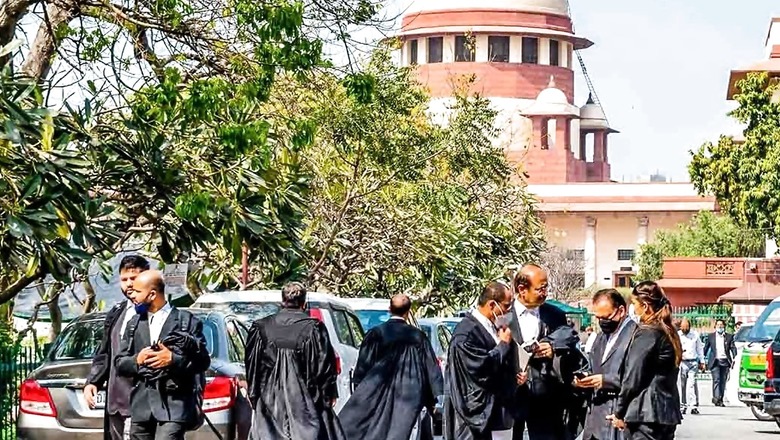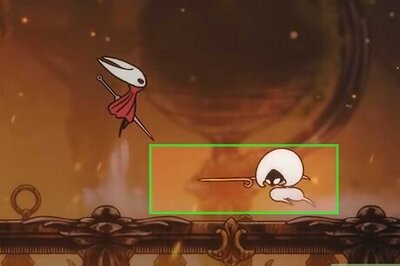
views
The acquittal of three men sentenced to death for gangrape and murder of a 19-year-old woman in Delhi’s Chhawla area has come as a shock to many. The Supreme Court in its judgment said that the prosecution “failed to prove their case” against the men, the Supreme Court said, giving them “the benefit of the doubt”.
While the Delhi High Court had likening the men to “predators” trawling the streets “hunting for prey”, the Supreme Court bench led by Chief Justice UU Lalit said the prosecution failed to prove the charges against the three men “beyond reasonable doubt” and the court acted like a “passive umpire” while convicting them.
The three men, Ravi Kumar, Rahul and Vinod, are accused of abducting, gangraping and brutally killing the woman in February 2012. Her mutilated body was found three days after she was abducted.
According to the Judgment, Here Are Reasons for Acquittal of the 3 Convicts:
PROSECUTION HAS NOT PROVED GUILT BEYOND REASONABLE DOUBT: Having regard to the totality of circumstances and the evidence on record, it is difficult to hold that the prosecution had proved the guilt of the accused by adducing cogent and clinching evidence.
NO CHAIN OF CIRCUMSTANTIAL EVIDENCE: As per the settled legal position, in order to sustain conviction, the circumstances taken cumulatively should form a chain so complete that there is no escape from the conclusion that within all human probability, the crime was committed by the accused only and none else. The circumstantial evidence must be complete and incapable of explanation of any other hypothesis than that of the guilt of the accused and such evidence should not only be consistent with the guilt of the accused but should be inconsistent with his innocence.
NO CLINCHING, CLEAR EVIDENCE: As demonstrated earlier, the evidence with regard to the arrest of the Appellants-accused, their identification, discoveries and recoveries of the incriminating articles, identity of the Indica Car, the seizures and sealing of the articles and collection of samples, the medical and scientific evidence, the report of DNA profiling, the evidence with regard to the CDRs etc. were not proved by the prosecution by leading, cogent, clinching and clear evidence much less unerringly pointing the guilt of the accused.
THERE CANNOT BE PUNISHMENT BASED ON MORAL CONVICTION OR SUSPICION ALONE: The prosecution has to bring home the charges levelled against them beyond reasonable doubt, which the prosecution has failed to do in the instant case, resultantly, the Court is left with no alternative but to acquit the accused, though involved in a very heinous crime. It may be true that if the accused involved in the heinous crime go unpunished or are acquitted, a kind of agony and frustration may be caused to the society in general and to the family of the victim in particular, however the law does not permit the Courts to punish the accused on the basis of moral conviction or on suspicion alone. No conviction should be based merely on the apprehension of indictment or condemnation over the decision rendered.
GLARING LAPSES DURING TRIAL: Every case has to be decided by the Courts strictly on merits and in accordance with law without being influenced by any kind of outside moral pressures or otherwise. The Court is constrained to make these observations as the Court has noticed many glaring lapses having occurred during the course of the trial.
KEY WITNESSES NOT CROSS–EXAMINED: It has been noticed from the record that out of the 49 witnesses examined by the prosecution, 10 material witnesses were not cross-examined and many other important witnesses were not adequately cross-examined by the defence counsel. It may be reminded that Section 165 of the Indian Evidence Act confers unbridled powers upon the trial courts to put any question at any stage to the witnesses to elicit the truth.
TRIAL JUDGE CANNOT BE A PASSIVE UMPIRE: As observed in several decisions, the Judge is not expected to be a passive umpire but is supposed to actively participate in the trial, and to question the witnesses to reach to a correct conclusion. In the instant case, material witnesses examined by the prosecution having not been either cross-examined or adequately examined, and the trial court also having acted as a passive umpire, we find that the Appellants-accused were deprived of their rights to have a fair trial, apart from the fact that the truth also could not be elicited by the trial court. We leave it to the wisdom and discretion of the trial courts to exercise their powers under Section 165 of the Indian Evidence Act for eliciting the truth in the cases before them, howsoever heinous or otherwise they may be.
CONVICTS ARE GIVEN BENEFIT OF DOUBT: Having said that and for the reasons stated above, the judgments and orders of conviction and sentence passed by the trial court and the High Court are set aside. The Appellants-accused are acquitted from the charges leveled against them by giving them a benefit of doubt, and they are directed to be set free forthwith if not required in any other case. The appeals deserve to be allowed accordingly.
The Criticism:
The judgment has drawn criticism. While the women’s right activists asserted that this will embolden the accused, Uttarakhand chief minister Pushkar Singh Dhami said that he has spoken to the advocate who is handling the case and Union law minister Kiren Rijiju. He added that his government will go everything to ensure justice to the victim.
Uttarakhand | On the decision that the court has made, I've spoken to Advocate Charu Khanna who is handling the case & Union Law Minister Kiren Rijiju. The victim is the daughter of our country & we'll do everything to ensure she gets justice: CM PS Dhami on Chhawla rape case https://t.co/4cjDlNFZ9h pic.twitter.com/9blNKtwY2H— ANI UP/Uttarakhand (@ANINewsUP) November 8, 2022
Activist Yogita Bhayana was standing outside the Supreme Court with the victim’s parents when the verdict was monitoring the proceedings. “I am totally overwhelmed. In the morning, we were fully hopeful that the apex court will uphold the capital punishment and we were even mentally prepared that they might convert the death sentence to life imprisonment.
“But when I first heard about the acquittal, I could not believe my ears. There is absolutely no justification for this acquittal. We will go for an appeal,” she said. She said the victim’s parents are “speechless and completely shattered”.
Ranjana Kumari, a social activist and director of the Centre for Social Research, asked why should women believe in the system of justice when rapists are at large.
Why are we failing to deliver Justice to Rape victims? In Chhawla Rape case the Rapist were given death penalty on the basis of evidence. It was upheld by high Court so what happened in Supreme Court ?Why should women believe in Justice system?Rapist are at large.— Dr. Ranjana Kumari (@ranjanakumari) November 7, 2022
About 2012 Chhawla Rape Case:
In 2014, a trial court awarded death penalty to the three accused, terming the case “rarest-of-rare”. The judgment was later upheld by the Delhi High Court.
According to the prosecution, the woman worked in Gurgaon’s Cyber City area and belonged to Uttarakhand. She was returning from her workplace and was near her home when the three men abducted her in a car. When she didn’t return home, her parents lodged a missing person report, the prosecution said, adding that the woman’s mutilated and decomposing body was found in a village in Rewari, Haryana.
The police found multiple injuries on the woman’s body. Further investigation and autopsy revealed she was attacked with car tools, glass bottles, metal objects, and other weapons. She was also raped, they said. Police arrested the three men involved in the crime and said one of the accused allegedly took revenge after the woman turned down his proposal.
(With inputs from Ananya Bhatnagar in New Delhi)
Read all the Latest India News here



















Comments
0 comment